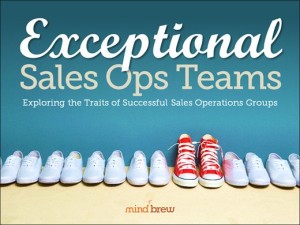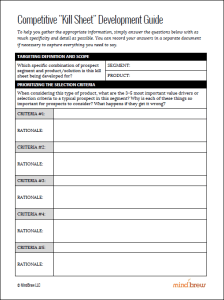At SellingBrew, we spend most of our time researching what leading sales operations teams are doing differently and sharing those findings, insights, and innovations with the rest of the SellingBrew Playbook community.
That’s what we do. That’s our “raison d’être”…our reason for being.
But today, rather than talking about what the best-of-the-best ARE doing, I want to talk about a few things leading sales ops teams ARE NOT doing. In fact, they’re so deliberate and adamant about not doing these things that it would be fair to say that they refuse to do these things:
1. Leading teams refuse to be reactive.
Leading sales operations teams are very proactive about defining and driving the agenda. These teams aren’t waiting to be told what to do, what their priorities should be, or where they should focus their energies. They figure out for themselves what needs to be done and where the biggest opportunities lie, and then work to get others in the company to share their perspectives.
When working directly with sales reps, leading sales ops teams strive to be helpful, of course. But they don’t view themselves as sales support or extra pairs of hands to do whatever the salespeople have no time or desire to do. They tend to view their interactions with salespeople as an opportunity to learn where the overall system could be improved.
2. Leading teams refuse to be tactical.
While many sales operations teams are content to focus solely on tactical execution and day-to-day firefighting, leading teams are much more strategic. They know the difference between working “in” the business and working “on” the business…and they choose to focus most of their time and attention on the latter. Not because it’s easier…it’s not in any way…but because it’s far more productive and beneficial.
Of course, these teams don’t ignore the tactical elements altogether. But they definitely put the tactical elements in proper perspective—as “cogs” that must all work together in a much larger machine. And in their view, the overall effectiveness and efficiency of the overall machine should always take precedence.
3. Leading teams refuse to get comfortable.
Something I’ve noticed about leading sales ops teams is that they never behave as though they’re in a leadership position. Their sales operation can be light years ahead of their nearest competitor and they’ll still be pushing forward on that next initiative like they’re the last runner in the race.
And the thing is, most of them know that they’re way out in front. Most of them recognize that they could actually “coast” for quite some time and still be extremely competitive. But these teams just aren’t wired that way. They’re not content to just “administer the system” and are always striving to achieve that next level of capability and performance.
Learning to emulate what leading sales ops teams are doing right is clearly an important and valuable endeavor. If we didn’t believe that wholeheartedly, we’d never have created the SellingBrew Playbook. That said, paying very close attention to what leading teams aren’t doing…what they refuse to do…can also be extremely instructive and enlightening.














